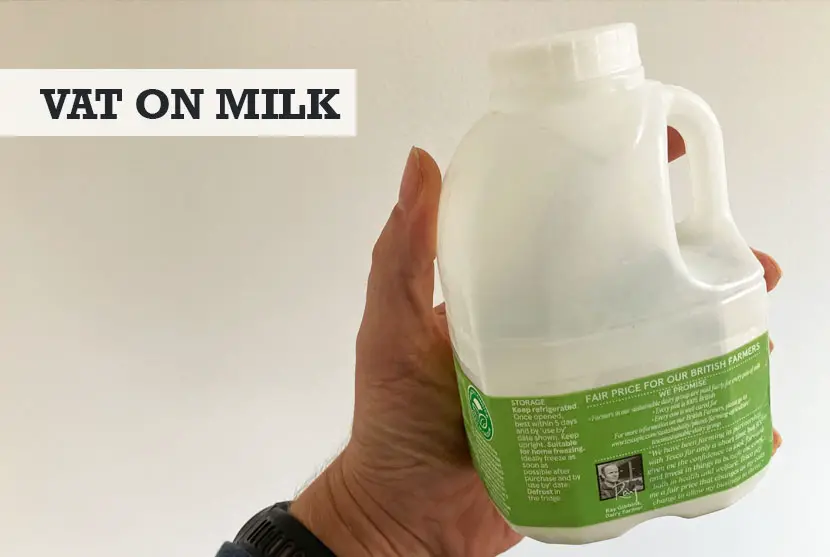Whether you are buying milk for your catering business, or doing a quick supermarket run to pick up milk for the office, or having a delivery to your premises, the question of VAT will still apply. We were recently asked whether there is VAT on milk, or whether it is zero-rated. Here’s all you need to know.
There is no VAT on milk in the UK. Milk is considered a basic food item so is zero-rated for VAT purposes. This means that no VAT is added to the price of milk, and businesses that sell milk are not required to charge VAT on their sales.
That’s the short answer, but if you want to know more about why there is no VAT on milk and any exceptions that might apply, read on.
VAT on milk: an overview
In the UK, Value Added Tax (VAT) is a tax that is added to the price of most goods and services. However, not all products will be subject to VAT, and the rate of VAT can vary depending on the item.
As we’ve established, there is no VAT on milk. It is not subject to VAT in the UK. According to VAT Notice 701/14, milk is considered a basic food item and is therefore zero-rated for VAT purposes.
Not only does this mean you don’t pay VAT on milk from supermarkets or deliveries, but also means businesses that sell milk should not charge VAT on their sales.
But there is VAT on flavoured milk…?
No VAT on milk applies to any cow’s milk variation you buy in a supermarket and also includes flavoured milk.
Understanding VAT on food and drink
VAT is added at each stage of production and distribution, and ultimately paid by the final consumer. The VAT rate is currently set at 20% for most goods and services, but when it comes to food products, VAT rules can be complex.
As a rule of thumb, most food products (including milk) are zero-rated, so no VAT is charged. However, there are some exceptions to this rule, and it is important for businesses to understand when and how VAT should be applied.
Zero-rated food products
Most basic food products are zero-rated for VAT purposes. This includes items such as bread, meat, fish, vegetables, and fruit. Dairy products, such as milk, cheese, and yogurt, are also zero-rated.
VAT on catering, delivery, and takeaway food
The rules around VAT on catering and takeaway food can be more complex. Any food that is supplied in the course of catering is subject to VAT at the standard rate of 20%. This includes hot takeaway food, such as fish and chips or pizza.
However, there are some exceptions to this rule. For example, cold takeaway food, such as sandwiches or salads, is zero-rated for VAT purposes. Additionally, if the food is supplied in a sealed package, such as a ready meal, it may also be zero-rated.
Specialised food products
There are some specialised food products that are subject to specific VAT rules. For example, baby food is zero-rated for VAT purposes, as are some dietary products, such as gluten-free bread or lactose-free milk. However, some products that might be considered as dietary supplements, such as protein powders or meal replacement shakes, may be subject to VAT at the standard rate.
VAT on milk from supermarkets
There is no VAT on milk from the supermarket. This applies to all variations of including whole milk, skimmed milk, semi-skimmed milk, and flavoured milk.
However, it is important to note that this only applies to milk that is sold as a standalone product for human consumption. If milk is used in the preparation of other food items, then the VAT rules for those items will apply.
For example, if milk is used in the production of cheese, then the VAT rules for cheese will apply. Similarly, if milk is used in the preparation of ready-to-eat meals, then the VAT rules for those meals will apply.
It is also worth noting that the zero-rating only applies to milk that is intended for human consumption. If milk is sold for animal feed or other non-human consumption purposes, then it may be subject to VAT.
In short, milk is zero-rated for VAT in the UK, which means that it is not subject to VAT when sold as a standalone product for human consumption. However, the VAT rules for other food items that contain milk may apply, and milk sold for non-human consumption purposes may be subject to VAT.

Jon has been in business since 1999, and in that time worked with more than 300 small business clients. As well as being an accountant, he is also an early adopter of tech, and has helped small businesses to leverage the power of their computer systems by creating software to automate and simplify accounting tasks.






